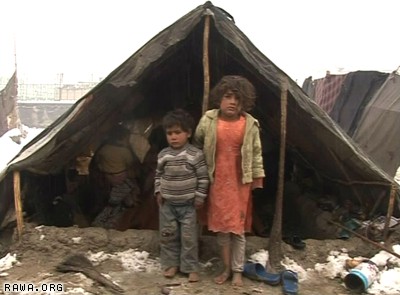Tens of thousands of Afghans displaced from their homes by escalating fighting and ongoing food shortages require immediate humanitarian assistance.

Displaced families living in suburbs of Kabul under horrible conditions due to sever cold.
Amnesty International has called on the international community to implement a comprehensive strategy for assisting the Afghan people. The call came as US President Barack Obama announced the deployment of an additional 17,000 US troops to Afghanistan.
"The US and the international community should adopt an approach that emphasizes the rights and well-being of the Afghan people and not just focus on a military solution," said Sam Zarifi, Amnesty International’s Asia-Pacific director.
Around 235,000 people are currently displaced in Afghanistan, according to estimates by the United Nations High Commissioner for Refugees (UNHCR). Most are displaced as a result of the fighting between government forces (and allied US and NATO troops) and armed opposition groups including the Taliban, particularly in the South, Southeast and Northwest regions of the country.
"Another hard winter has arrived in Afghanistan and tens of thousands of Afghans who already had some of the lowest standards of economic development in the world have been forced out of their homes," said Sam Zarifi.
The fighting between various armed groups in Afghanistan has aggravated the effects of an ongoing drought and growing food insecurity in northern and western Afghanistan, forcing thousands of families to seek shelter in relatively safer and wealthier areas, such as Herat and Kabul.
Most people displaced by fighting in Afghanistan have remained in southern Afghanistan, including in camps near Kandahar, where they remain vulnerable to ongoing fighting between government forces and the Taliban and are largely cut off from international assistance.
In December 2008, Amnesty International researchers visited several informal camps in Kabul and Herat provinces. Those interviewed said they received little, if any, assistance from government or non-government agencies.
"People in the camps in Kabul and Herat are living in extremely inadequate shelters with almost no heating and no bedding, where small children and elderly people had to sleep on the wet floor. Most of the people in those camps have little or no access to food, drinking water, health services and education," Sam Zarifi said. "Our researchers also came across numerous instances of communicable diseases such as tuberculosis."
A 35-year-old mother of eight in an informal camp in Kabul told Amnesty International:
"It’s about a year since we became displaced from Helmand province to Kabul because of the fighting [between government and Taliban insurgents]. Our homes were bombed [by NATO forces] and we lost everything we had. Here we have nothing, no job and no assistance. It was a long time ago when we received some rice and coal from an Afghan businessman. Since then we have nothing and I have to spend days and nights with no food."
According to the Afghan NGOs Safety Office (ANSO), in 2008, 31 staff members of non-governmental organizations were killed in Afghanistan, while 78 were abducted. ANSO recorded 176 attacks against NGO staff and facilities. So far in 2009, one NGO staff member has already been killed, seven have been abducted, and there have been 25 attacks against aid convoys and facilities.
"By targeting and killing aid workers, armed opposition groups are committing war crimes. They are also preventing the delivery of essential humanitarian assistance, thereby worsening the already miserable conditions facing tens of thousands of people who are already suffering from hunger and cold, particularly women and children cut off from health care and education," said Sam Zarifi.
All parties to the conflict, including armed opposition groups, have a legal obligation to allow and facilitate safe passage of impartial humanitarian assistance to civilians lacking supplies and services essential for their survival.
Amnesty International has called on the Afghan government, particularly the Ministry of Refugee and Repatriation Affairs, and all the other national and international aid agencies to provide immediate assistance for the displaced, including essential food and potable water, basic shelter, appropriate clothing and heating materials as well as essential medical services and sanitation, in line with the UN Guiding Principles on Internal Displacement.



